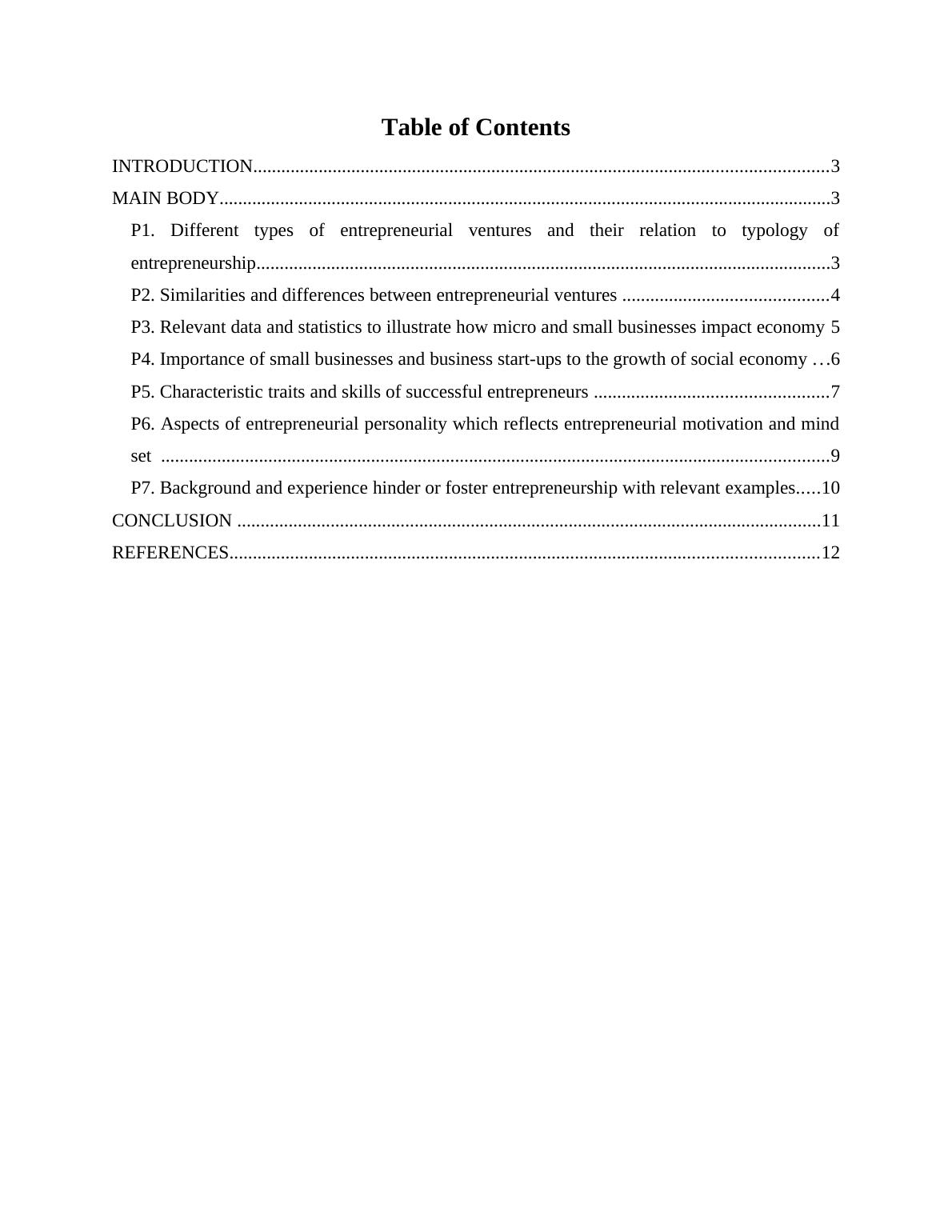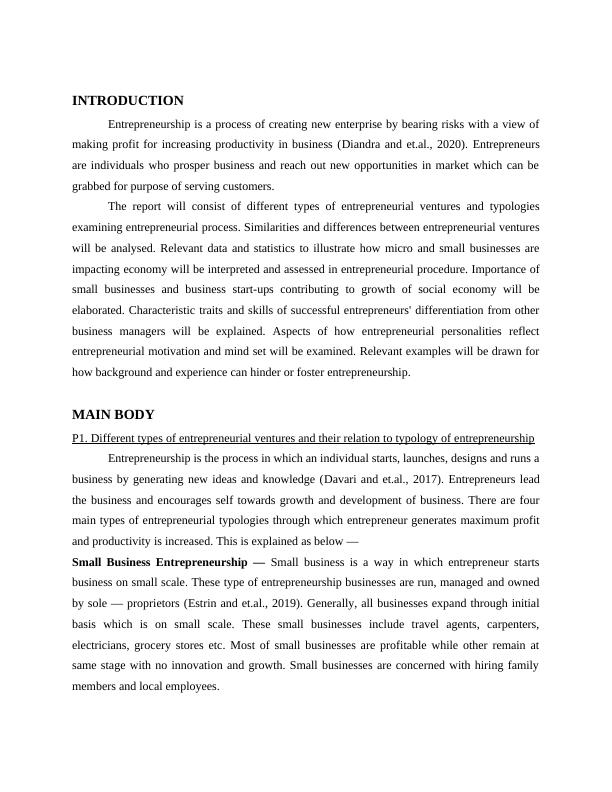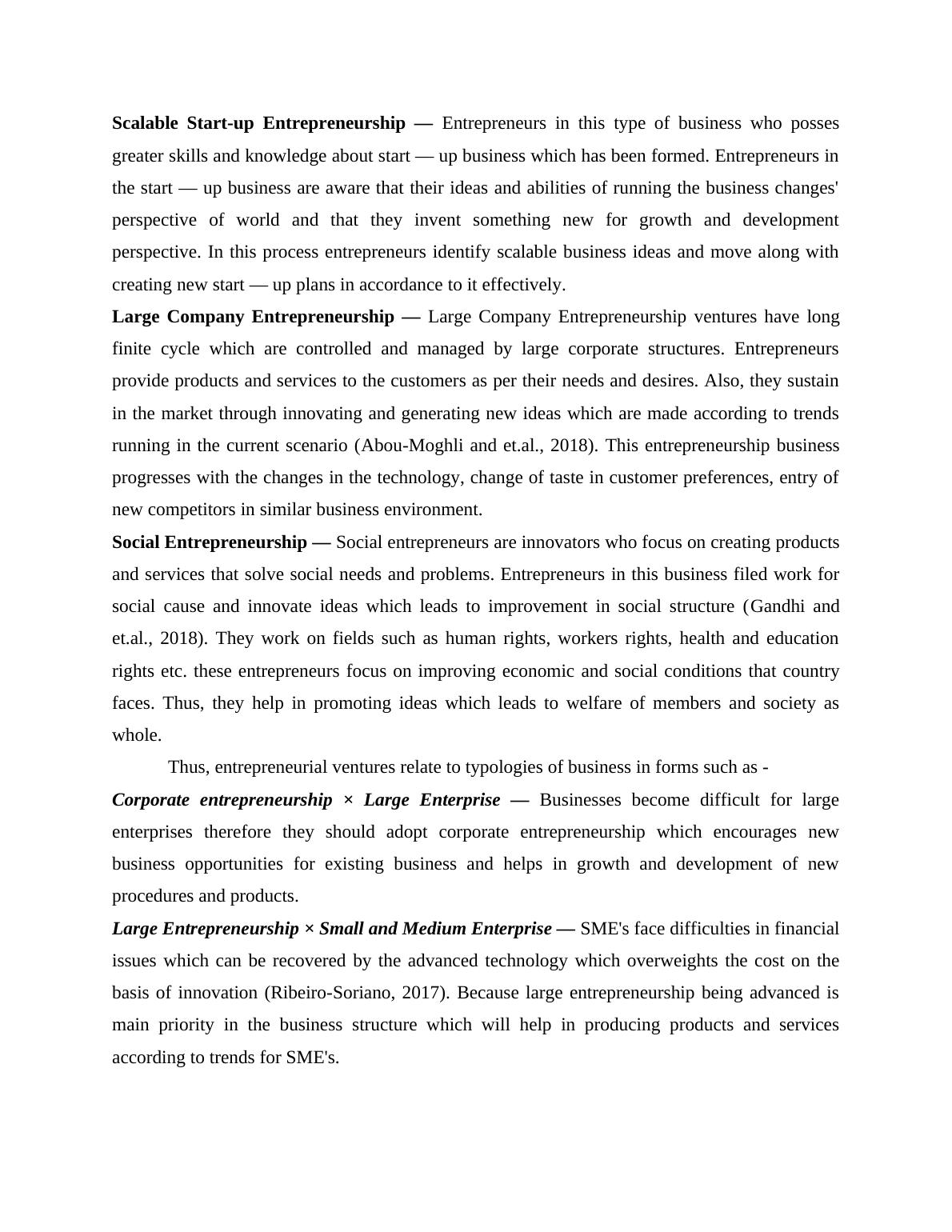Unit 9 - Entrepreneurship and Small Business Management
Added on 2022-12-27
14 Pages4139 Words100 Views
Entrepreneurship and Small
Business Management
Business Management

Table of Contents
INTRODUCTION...........................................................................................................................3
MAIN BODY...................................................................................................................................3
P1. Different types of entrepreneurial ventures and their relation to typology of
entrepreneurship...........................................................................................................................3
P2. Similarities and differences between entrepreneurial ventures ............................................4
P3. Relevant data and statistics to illustrate how micro and small businesses impact economy 5
P4. Importance of small businesses and business start-ups to the growth of social economy . . .6
P5. Characteristic traits and skills of successful entrepreneurs ..................................................7
P6. Aspects of entrepreneurial personality which reflects entrepreneurial motivation and mind
set ...............................................................................................................................................9
P7. Background and experience hinder or foster entrepreneurship with relevant examples.....10
CONCLUSION .............................................................................................................................11
REFERENCES..............................................................................................................................12
INTRODUCTION...........................................................................................................................3
MAIN BODY...................................................................................................................................3
P1. Different types of entrepreneurial ventures and their relation to typology of
entrepreneurship...........................................................................................................................3
P2. Similarities and differences between entrepreneurial ventures ............................................4
P3. Relevant data and statistics to illustrate how micro and small businesses impact economy 5
P4. Importance of small businesses and business start-ups to the growth of social economy . . .6
P5. Characteristic traits and skills of successful entrepreneurs ..................................................7
P6. Aspects of entrepreneurial personality which reflects entrepreneurial motivation and mind
set ...............................................................................................................................................9
P7. Background and experience hinder or foster entrepreneurship with relevant examples.....10
CONCLUSION .............................................................................................................................11
REFERENCES..............................................................................................................................12

INTRODUCTION
Entrepreneurship is a process of creating new enterprise by bearing risks with a view of
making profit for increasing productivity in business (Diandra and et.al., 2020). Entrepreneurs
are individuals who prosper business and reach out new opportunities in market which can be
grabbed for purpose of serving customers.
The report will consist of different types of entrepreneurial ventures and typologies
examining entrepreneurial process. Similarities and differences between entrepreneurial ventures
will be analysed. Relevant data and statistics to illustrate how micro and small businesses are
impacting economy will be interpreted and assessed in entrepreneurial procedure. Importance of
small businesses and business start-ups contributing to growth of social economy will be
elaborated. Characteristic traits and skills of successful entrepreneurs' differentiation from other
business managers will be explained. Aspects of how entrepreneurial personalities reflect
entrepreneurial motivation and mind set will be examined. Relevant examples will be drawn for
how background and experience can hinder or foster entrepreneurship.
MAIN BODY
P1. Different types of entrepreneurial ventures and their relation to typology of entrepreneurship
Entrepreneurship is the process in which an individual starts, launches, designs and runs a
business by generating new ideas and knowledge (Davari and et.al., 2017). Entrepreneurs lead
the business and encourages self towards growth and development of business. There are four
main types of entrepreneurial typologies through which entrepreneur generates maximum profit
and productivity is increased. This is explained as below —
Small Business Entrepreneurship — Small business is a way in which entrepreneur starts
business on small scale. These type of entrepreneurship businesses are run, managed and owned
by sole — proprietors (Estrin and et.al., 2019). Generally, all businesses expand through initial
basis which is on small scale. These small businesses include travel agents, carpenters,
electricians, grocery stores etc. Most of small businesses are profitable while other remain at
same stage with no innovation and growth. Small businesses are concerned with hiring family
members and local employees.
Entrepreneurship is a process of creating new enterprise by bearing risks with a view of
making profit for increasing productivity in business (Diandra and et.al., 2020). Entrepreneurs
are individuals who prosper business and reach out new opportunities in market which can be
grabbed for purpose of serving customers.
The report will consist of different types of entrepreneurial ventures and typologies
examining entrepreneurial process. Similarities and differences between entrepreneurial ventures
will be analysed. Relevant data and statistics to illustrate how micro and small businesses are
impacting economy will be interpreted and assessed in entrepreneurial procedure. Importance of
small businesses and business start-ups contributing to growth of social economy will be
elaborated. Characteristic traits and skills of successful entrepreneurs' differentiation from other
business managers will be explained. Aspects of how entrepreneurial personalities reflect
entrepreneurial motivation and mind set will be examined. Relevant examples will be drawn for
how background and experience can hinder or foster entrepreneurship.
MAIN BODY
P1. Different types of entrepreneurial ventures and their relation to typology of entrepreneurship
Entrepreneurship is the process in which an individual starts, launches, designs and runs a
business by generating new ideas and knowledge (Davari and et.al., 2017). Entrepreneurs lead
the business and encourages self towards growth and development of business. There are four
main types of entrepreneurial typologies through which entrepreneur generates maximum profit
and productivity is increased. This is explained as below —
Small Business Entrepreneurship — Small business is a way in which entrepreneur starts
business on small scale. These type of entrepreneurship businesses are run, managed and owned
by sole — proprietors (Estrin and et.al., 2019). Generally, all businesses expand through initial
basis which is on small scale. These small businesses include travel agents, carpenters,
electricians, grocery stores etc. Most of small businesses are profitable while other remain at
same stage with no innovation and growth. Small businesses are concerned with hiring family
members and local employees.

Scalable Start-up Entrepreneurship — Entrepreneurs in this type of business who posses
greater skills and knowledge about start — up business which has been formed. Entrepreneurs in
the start — up business are aware that their ideas and abilities of running the business changes'
perspective of world and that they invent something new for growth and development
perspective. In this process entrepreneurs identify scalable business ideas and move along with
creating new start — up plans in accordance to it effectively.
Large Company Entrepreneurship — Large Company Entrepreneurship ventures have long
finite cycle which are controlled and managed by large corporate structures. Entrepreneurs
provide products and services to the customers as per their needs and desires. Also, they sustain
in the market through innovating and generating new ideas which are made according to trends
running in the current scenario (Abou-Moghli and et.al., 2018). This entrepreneurship business
progresses with the changes in the technology, change of taste in customer preferences, entry of
new competitors in similar business environment.
Social Entrepreneurship — Social entrepreneurs are innovators who focus on creating products
and services that solve social needs and problems. Entrepreneurs in this business filed work for
social cause and innovate ideas which leads to improvement in social structure (Gandhi and
et.al., 2018). They work on fields such as human rights, workers rights, health and education
rights etc. these entrepreneurs focus on improving economic and social conditions that country
faces. Thus, they help in promoting ideas which leads to welfare of members and society as
whole.
Thus, entrepreneurial ventures relate to typologies of business in forms such as -
Corporate entrepreneurship × Large Enterprise — Businesses become difficult for large
enterprises therefore they should adopt corporate entrepreneurship which encourages new
business opportunities for existing business and helps in growth and development of new
procedures and products.
Large Entrepreneurship × Small and Medium Enterprise — SME's face difficulties in financial
issues which can be recovered by the advanced technology which overweights the cost on the
basis of innovation (Ribeiro-Soriano, 2017). Because large entrepreneurship being advanced is
main priority in the business structure which will help in producing products and services
according to trends for SME's.
greater skills and knowledge about start — up business which has been formed. Entrepreneurs in
the start — up business are aware that their ideas and abilities of running the business changes'
perspective of world and that they invent something new for growth and development
perspective. In this process entrepreneurs identify scalable business ideas and move along with
creating new start — up plans in accordance to it effectively.
Large Company Entrepreneurship — Large Company Entrepreneurship ventures have long
finite cycle which are controlled and managed by large corporate structures. Entrepreneurs
provide products and services to the customers as per their needs and desires. Also, they sustain
in the market through innovating and generating new ideas which are made according to trends
running in the current scenario (Abou-Moghli and et.al., 2018). This entrepreneurship business
progresses with the changes in the technology, change of taste in customer preferences, entry of
new competitors in similar business environment.
Social Entrepreneurship — Social entrepreneurs are innovators who focus on creating products
and services that solve social needs and problems. Entrepreneurs in this business filed work for
social cause and innovate ideas which leads to improvement in social structure (Gandhi and
et.al., 2018). They work on fields such as human rights, workers rights, health and education
rights etc. these entrepreneurs focus on improving economic and social conditions that country
faces. Thus, they help in promoting ideas which leads to welfare of members and society as
whole.
Thus, entrepreneurial ventures relate to typologies of business in forms such as -
Corporate entrepreneurship × Large Enterprise — Businesses become difficult for large
enterprises therefore they should adopt corporate entrepreneurship which encourages new
business opportunities for existing business and helps in growth and development of new
procedures and products.
Large Entrepreneurship × Small and Medium Enterprise — SME's face difficulties in financial
issues which can be recovered by the advanced technology which overweights the cost on the
basis of innovation (Ribeiro-Soriano, 2017). Because large entrepreneurship being advanced is
main priority in the business structure which will help in producing products and services
according to trends for SME's.

End of preview
Want to access all the pages? Upload your documents or become a member.
Related Documents
Entrepreneurship and Small Business Managementlg...
|16
|5154
|53
The Impact of Micro and Small Business on the Economylg...
|17
|5294
|373
Entrepreneurship and Small Business Managementlg...
|23
|4017
|63
Entrepreneurship And Small Business Management in UKlg...
|15
|4448
|263
Entrepreneurship and Small Business Managementlg...
|12
|3983
|28
Entrepreneurship and Small Business Managementlg...
|16
|4789
|91